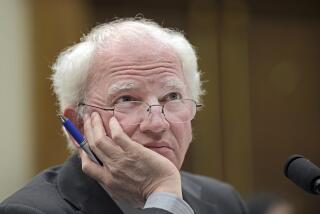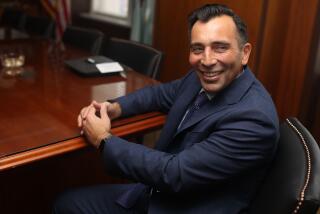Legal larceny by lawyers
What’s the difference between a mosquito and a lawyer?
One is a blood-sucking parasite. The other is an insect.
I’m a lawyer, but I live out of state and haven’t practiced law in recent years, so I am at this point an “inactive” member of the California State Bar. That means I don’t have clients, which is a good thing, because if I did, chances are I would have to steal from them. At least, that’s how I see California’s Interest on Lawyers Trust Accounts, or IOLTA, program.
IOLTA is a scheme that only a lawyer could have devised. Strict ethics rules have traditionally dictated how attorneys must deal with funds that pass through their hands but actually belong to their clients: settlements in auto accident cases, for example, or the proceeds from marital property sold in a divorce. These funds must be sequestered in a separate checking account called a “trust account” and never commingled with the lawyer’s own money.
That changed in 1980, the year Congress allowed checking accounts to pay interest for the first time. The legislation prompted state bar groups across the country to begin planning ways to get their hands on checking account interest.
The reasoning was that, in most cases, the sums of money being held by a lawyer were so modest, and the time a lawyer had them so brief, that the money couldn’t really earn interest for clients because it would be eaten up by service fees and other transaction costs. But if lawyers were compelled to place those sums in a statewide pool, the resulting amalgamation of client money could generate substantial interest, which could be used by the bar groups to support free legal services for the poor.
But I can’t understand why, if it is client funds that generate the money, that money doesn’t belong to the clients whose funds have generated the interest. Sure it might not be much, but why should it belong to the bar groups and the high-minded lawyers who run them?
Most of my fellow attorneys don’t seem to see things this way. All 50 states and the District of Columbia now have IOLTA systems, most of them mandatory like California’s. It’s like the 1999 cult-classic movie “Office Space,” in which discontented employees hatch a scheme to skim off minute amounts from each of their corporate employer’s financial transactions. Except that in “Office Space,” the embezzlement is understood, even by the perpetrators, to be a crime. Under IOLTA, the larceny is perfectly legal.
Indeed, in 2003 the U.S. Supreme Court ruled 5 to 4 (over the vehement objections of Justice Antonin Scalia and other court conservatives) that because clients in effect suffer “zero” in terms of “pecuniary loss,” IOLTA programs don’t constitute a government taking of property that would violate the 5th Amendment. Ironically, clients who are “rich” in terms of funds parked temporarily with their lawyers (wealthy divorcing couples, for example) don’t have to go through IOLTA but get to have their money put into regular trust accounts that actually pay them interest.
In Occupy Wall Street terms, IOLTA operates for the benefit of the 1%, not the 99%.
Individual clients may collect nothing, but the aggregate amount of IOLTA interest reached a staggering $263 million nationwide during the peak pre-recession year of 2008. And that meant a lot of unsuspecting clients funding things they may or may not have believed in because not all of the money goes to helping indigent people fight eviction or get restraining orders against abusive boyfriends.
Listed among the 100 or so beneficiaries of the California State Bar’s IOLTA largesse are the California Women’s Law Center, which takes credit for having “helped defeat” two recent ballot measures, Propositions 73 and 85, that would have required parental notification before teen abortions; the National Immigration Law Center, which promotes amnesty and the Dream Act for illegal immigrants; and the Center for Human Rights and Constitutional Law, which has filed a class-action suit on behalf of a lesbian couple challenging the constitutionality of the federal Defense of Marriage Act.
Even the bread-and-butter legal aid offices that California’s IOLTA program supports have wandered into areas far afield from providing no-cost lawyering to the destitute. The Legal Aid Foundation Los Angeles, for example, represented a coalition that included Physicians for Social Responsibility Los Angeles in a recently settled lawsuit challenging the construction of an NFL stadium downtown. Why physicians need free attorneys is beyond me.
Recently, though, the gods have shown that they have a sense of humor after all. Since 2008, a combination of economic distress and Federal Reserve policy has sent interest rates plunging, and with them the returns on IOLTA accounts. From fiscal 2008 to fiscal 2009, California’s IOLTA fund thudded from an all-time high of $20.2 million to $6.8 million, and it hasn’t recovered.
The State Bar persuaded the Legislature to create a “Justice Gap Fund,” which inserts a voluntary contribution of $100 as a line item into California lawyers’ bar dues bill to make up for the missing IOLTA swag. I received a plaintive email from State Bar President Patrick M. Kelly a few days ago begging me to help out with a C-note to benefit “the millions of Californians with nowhere else to turn.”
The State Bar’s dues bill is already as confusing as the Florida butterfly ballot that supposedly cost Al Gore the presidential election in 2000. It takes an IQ of 200 to maneuver through the thicket of voluntary opt-ins and opt-outs (for lobbying, “elimination of bias” and so forth) in order to figure out what you actually have to pay. But it turns out that California lawyers aren’t stupid, and they aren’t very generous either, at least when it comes to their own money. During the last three fiscal years — 2010, 2011 and 2012 — bar members contributed $780,000, $830,000, and $810,000, respectively, to the Justice Gap Fund. That’s less than $4 a year for each of California’s 242,000 lawyers.
Margaret Thatcher famously said: “The problem with socialism is that eventually you run out of other people’s money.” IOLTA is an experiment in using other people’s money to buy advocacy that liberal lawyers like — but not enough to pay for it themselves.
Charlotte Allen is member #61947 of the California State Bar under her maiden name, Charlotte Irene Low.
More to Read
A cure for the common opinion
Get thought-provoking perspectives with our weekly newsletter.
You may occasionally receive promotional content from the Los Angeles Times.






